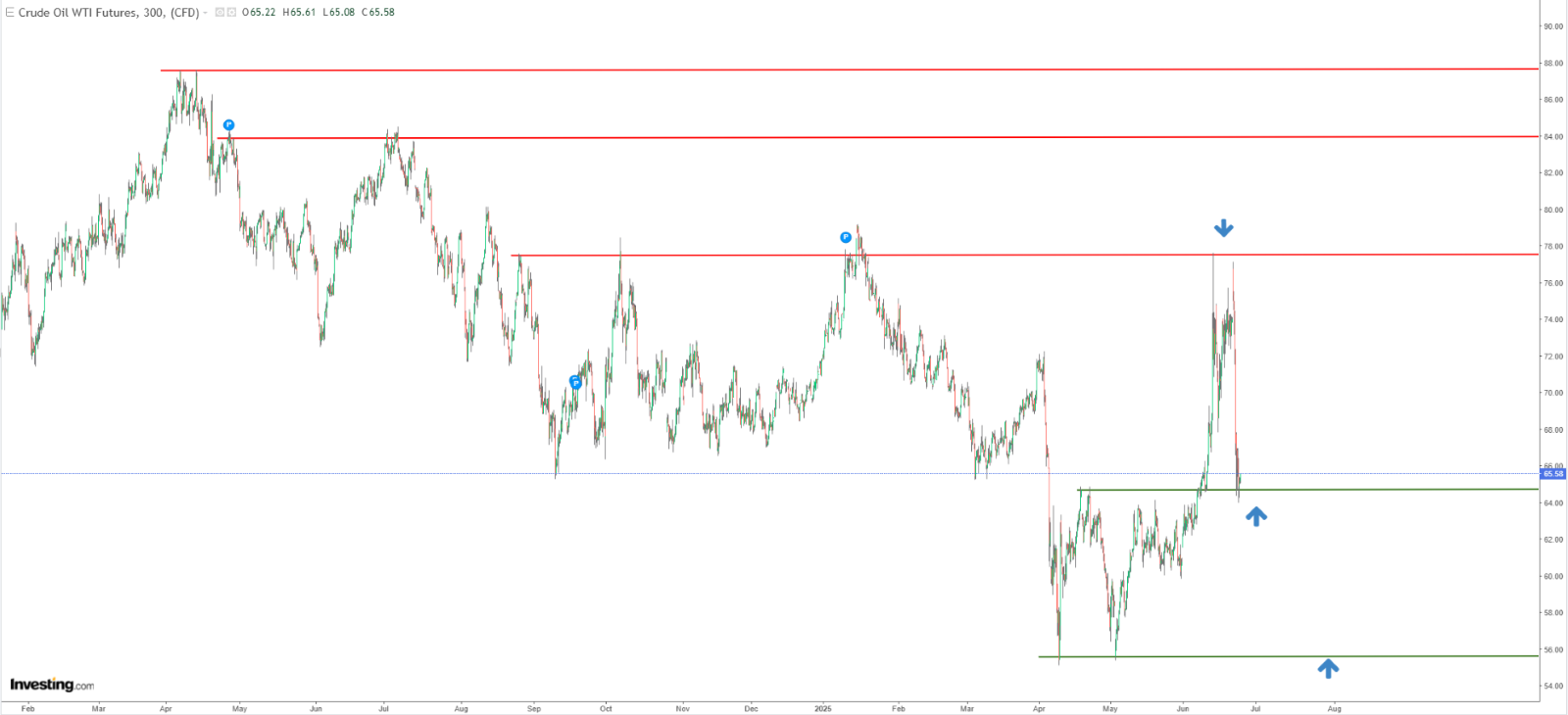LATAM Airlines pilots in Chile to begin strike at midnight Wednesday
- WTI and Brent prices retreat as geopolitical risks ease and ceasefire holds for now.
- Market shifts focus back to core fundamentals: China demand, OPEC+ supply, and US output.
- $65 is key support; breach could push prices toward $60 or even $55 per barrel.
- Looking for more actionable trade ideas? Subscribe now to unlock access to InvestingPro’s AI-selected stock winners for up to 50% off amid the summer sale.
Recent wars in the Middle East, especially those involving Israel, have often been short and intense. The Iran-Israel conflict, now being called the ’Twelve-Day War’, seems to follow that pattern. Both countries have claimed victory and agreed to a ceasefire, but the peace is shaky. The deeper issues behind the conflict remain unresolved.
For now, though, tensions are easing. The risk of a major escalation, like closing the Strait of Hormuz, appears to be fading. As a result, oil prices—both WTI and Brent—are falling and could keep dropping in the near future.
Oil Market Refocuses on Demand and Supply Trends
During times of conflict—especially in key oil-producing regions like the Middle East—uncertainty about stable oil production and supply usually drives prices higher. One of the most important parts of the global oil supply chain is the Strait of Hormuz, which handles about one-fifth of the world’s oil shipments. If this route were blocked, oil prices could easily cross $100 per barrel and might even rise to $110–120.
Now that the conflict has stopped, the chance of Tehran blocking the Strait has dropped sharply. As a result, the market is likely to shift its focus back to usual price drivers—mainly demand from China and supply decisions by OPEC+ and the US.
OPEC+ is still increasing oil production, partly because some member countries did not stick to earlier limits. This has caused frustration for Saudi Arabia, the group’s unofficial leader. In response, Saudi Arabia is boosting its own output to pressure the others, which is creating tension within the group.
On top of that, there could be more oil coming from the US and regions like South America. All of this combined could keep oil prices under pressure and lead to more selling.
Ongoing trade talks and tariff policies also remain important for the oil market. The US-China trade deal is still in place, but it could change at any time. In other key areas, like Japan and the EU, no final agreements have been reached, and there are no signs of progress for now.
If these talks fail or existing deals fall apart, it could hurt global economic activity. That would likely push oil prices lower.
WTI Crude Oil Resumes Downtrend
WTI crude oil prices swung sharply in response to the Middle East conflict but have now returned to levels seen before the escalation began.

The current focus is on the support level around $65 per barrel. If prices fall below this level, they could head toward this year’s lows near $55, with a possible pause around $60—assuming the Middle East truce holds.
****
Be sure to check out InvestingPro to stay in sync with the market trend and what it means for your trading. Whether you’re a novice investor or a seasoned trader, leveraging InvestingPro can unlock a world of investment opportunities while minimizing risks amid the challenging market backdrop.
- ProPicks AI: AI-selected stock winners with a proven track record.
- InvestingPro Fair Value: Instantly find out if a stock is underpriced or overvalued.
- Advanced Stock Screener: Search for the best stocks based on hundreds of selected filters and criteria.
- Top Ideas: See what stocks billionaire investors such as Warren Buffett, Michael Burry, and George Soros are buying.
Disclaimer: This article is written for informational purposes only. It is not intended to encourage the purchase of assets in any way, nor does it constitute a solicitation, offer, recommendation or suggestion to invest. I would like to remind you that all assets are evaluated from multiple perspectives and are highly risky, so any investment decision and the associated risk belongs to the investor. We also do not provide any investment advisory services.

